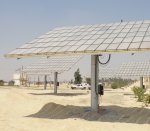In the Egyptian desert, arable land is scarce and water almost nonexistent, so farming is a tough business. One resource you know you can rely on in a desert is plenty of sunshine, so some farmers in Upper Egypt have turned to harvesting the energy from the sun for irrigation, with help from Germany’s Fraunhofer Institute.
In Wadi El Natrun, situated far from mains electricity grids, the dry-climate fruits and vegetables grown are watered from wells deep underground. Once farmers used diesel generators to pump water for the fields, but now a self-contained concentrated photovoltaic (CPV) system controls and manages an entire irrigation system.
CPV solar panels – which utilise special Fresnel lenses that intensify sunlight onto tiny solar cells at the back of the panel – track the sun to ensure optimal solar yield. They supply the energy for a submersible pump that draws water from a well 105 feet deep and for a small desalination unit. The CPV cells also supply the energy for PV-module trackers, the monitoring and control system and an air-conditioning unit that cools the utility room of the facility.
Jakob Wachtel, a project developer from the Fraunhofer Institute, says by using CPV technology they were able to overcome the expensive problem of energy storage in large batteries. CPV modules are more efficient and use less space than traditional silicon solar panels. The Wadi El Natrun system only needs a small battery used to align the CPV tracker and boot up the computer monitoring system.
A sophisticated computer system ensures the system manages the generation and use of solar energy in an efficient way, optimising usage so it immediately goes where it is needed, such as the submersible pump to fill up the water reservoir, the irrigation pump when it is time to irrigate the field or the desalination unit.
"Where there is no public power grid, the PV systems currently operate cost-effectively, due to their low operating costs," Wachtel says.
Solar powered bore water pumps are also widely used on farms and outback stations in Australia to supply water to livestock and general irrigation.
Source/Image source –Fraunhofer Institute







































